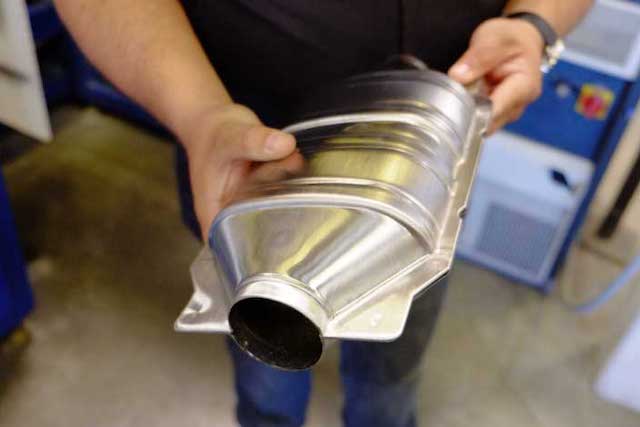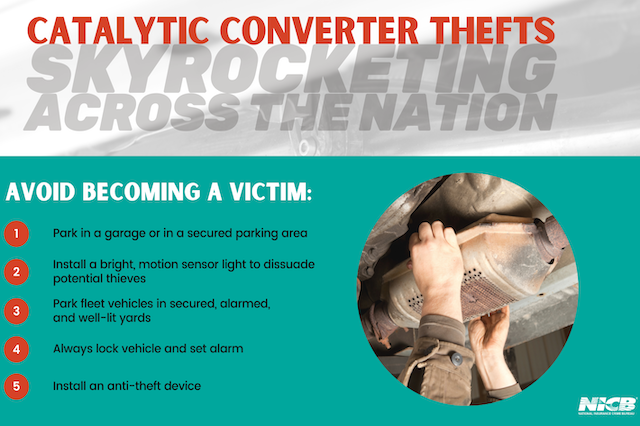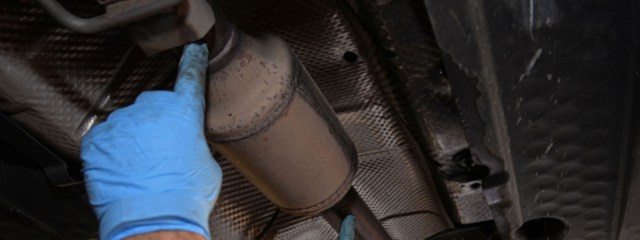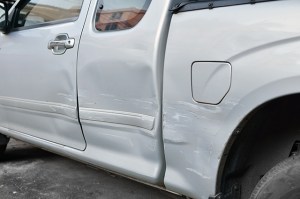You’ve probably heard the term “catalytic converter” recently. Unfortunately, it’s likely for all the wrong reasons.
Theft of this important car part has been rampant in the last few years. In 2019, 3,389 catalytic converters were reported stolen across the country, with 14,433 stolen in 2020, 52,000 in 2021 and 153,000 catalytic converters stolen in 2022. Although thefts did decline in 2023, the risk still remains.
We know the motivation behind stealing valuable cars, but why the specific interest in catalytic converters?

What Is a Catalytic Converter?
A catalytic converter is an important feature of your car’s exhaust system. Its purpose is to limit the amount of harmful pollutants emitted by an internal combustion engine. Located between the vehicle’s engine and tailpipe, these devices convert toxic gases found in car emissions, such as carbon monoxide and nitrogen oxides, into less-harmful substances like carbon dioxide and water vapor.
Catalytic converters are filled with precious metals, which act as the catalysts. Most often, these include palladium, rhodium and platinum. When the engine emissions’ harmful gases pass through the device, they make contact with these metals and undergo a chemical reaction. This process alters their molecular structure, converting them into safer substances.
Why Are Catalytic Converters Stolen?
The reason these catalytic converters are stolen so often lies in what’s inside them. There is both a high demand and limited supply of the precious metals contained in these devices. Recent disruptions in supply chains have made them even more difficult to source and, in turn, even more expensive.
This has turned catalytic converters, which can be removed from cars in a matter of minutes with readily available tools, into valuable commodities. Today, catalytic converters are worth more than gold – literally. Platinum, palladium and rhodium are each worth thousands of dollars per ounce. Catalytic converters typically have just a few combined grams of these metals. That would still fetch a price of at least a few hundred dollars, possibly up to $1,000.
Cars Most Likely to Have Catalytic Converter Stolen
All catalytic converters are valuable and thus prone to theft. But those found in two vehicle segments are most likely to be stolen, for vastly different reasons. One because they’re more valuable and the other, because they are easy to get to.
Catalytic converters work most effectively in high temperatures, which is why they are typically located near the engine. Because the engine in hybrid vehicles is not always in use, the converters fail to heat up to optimal temperatures. Therefore, the converters in hybrid vehicles have more of the precious (and expensive) metals to make up for the lack of efficiency.
Larger vehicles like SUVs and trucks are victims of their own circumstance. A higher ground clearance makes it easier for a thief to slide under the vehicle and remove the converter.
How to Tell If Your Catalytic Converter Is Stolen
It’s unlikely you’re looking underneath your car every time you go for a drive. So how else can you tell if your catalytic converter has been stolen? It will be readily apparent once you start your car.
Without a catalytic converter, your car will make a loud, roaring sound once the engine starts. You may also notice the check engine light on and the vehicle not driving smoothly.

How to Protect Your Catalytic Converter From Getting Stolen
Install an Anti-Theft Device
Installing an anti-theft device over your catalytic converter is the most effective way to prevent it from being stolen. There are several types of devices available, including shields, cages and steel cables. Check with your mechanic to see if this is would be a safe solution for your vehicle.
Etch Your License Plate Number or VIN Onto the Catalytic Converter
This step can’t stop a thief from stealing the catalytic converter, but it could deter them. If the component should get taken, the unique marking can alert potential buyers that it is stolen. This may make it more difficult to sell and less appealing to thieves. Nearly two dozen states have passed or are considering legislation that would more closely regulate the purchase of scrap catalytic converters.
Park in a Smart Spot
Whenever possible, park your car inside a closed garage or in your driveway. If you’re parking away from home, leave the vehicle in a well-lit area.
The Most Stolen Car Parts
Catalytic converters are not the only vehicle components thieves are trying to get their hands on. Here are some other commonly stolen car parts.
Tires and Wheels
Car tires and wheels check a lot of boxes for thieves. They can be easily removed in just a few minutes, they’re expensive and they’re essential for every automobile yet commonly replaced, so there’s always a market for re-selling. An easy way to protect your wheels from theft is by installing wheel locks. These are specially designed lug nuts that can only be removed with a unique wheel lock key as opposed to a standard socket.
Batteries
These don’t hold quite as much appeal as other commonly stolen car parts because used car batteries are not overly expensive. They are, however, simple to remove, making them easy targets. Installing after-market hood locks can prevent anyone from accessing the battery.
Air Bags
Air bags need to be replaced once they’re deployed, creating an ongoing demand for these safety features, and an opportunity for thieves to make money. Approximately 50,000 air bags are stolen each year at a cost of more than $50 million, according to the NICB.
Tailgates
Truck tailgates can often be removed in less than a minute without the need of any tools and can fetch hundreds of dollars on the resale market. While many newer pickup models now have locking systems, owners of older trucks can install their own tailgate locks.
How Can Insurance Help?
Having comprehensive coverage on your policy will ensure you are protected from stolen car parts. Sometimes (and less confusingly) called “other than collision,” it provides coverage from damage caused by an incident other than a crash, including theft. While only mandatory if you are leasing or financing a vehicle, this inexpensive option could prove to be invaluable if you find yourself the victim of a stolen catalytic converter or other car part. Catalytic converter repair could cost thousands of dollars.
Should you need to use your comprehensive coverage, your deductible would apply.
Reach out to a AAA Insurance agent to discuss your auto insurance coverage options.
This article has been updated and republished from a previous version.
19 Thoughts on “Why Are Catalytic Converters Stolen?”
Leave A Comment
Comments are subject to moderation and may or may not be published at the editor’s discretion. Only comments that are relevant to the article and add value to the Your AAA community will be considered. Comments may be edited for clarity and length.















All junkyards have a license from the local licensing authority. Not too hard for the authority to issue an order that the only way a catalytic converter can be received by a junk yard is for the converter to be on a junked vehicle and not hand carried in for sale. Most local licensing authorities have a license investigator on staff (usually a policeman). Violate the order, lose your license to operate!
How about a dog? My 2 dogs don’t miss anything going on outside in front of my picture window!
Etching a number into a converter is largely useless. A thief can use a grinder or a Dremel motor tool to take that off in seconds. I’m sure they know this.
Combustion is a chemical process that converts fuel (hydrocarbons) into simpler chemicals, mainly water (H2O) and carbon dioxide (CO2). Forf example, a campfire produces a plume of smoke thats thick and dark just above the flames then dissolves a few seconds later as the smoke rises and the process continues to completion. By definition, a catalyst speeds up a chemical process so it will end sooner.
In a car, the catalyst speeds up the combustion process so it will be complete at the end of the tail pipe instead continuing a few seconds longer oiutside the tailpipe.
In the end, the catalytic converted does not make the air any cleaner. If cars were built without converters there would not be any to steal and the air would be just as clean.
My neighbor’s catalytic converter was stolen. It cost $1000 to replace it. There are only a few screws that hold them in place making them easy to steal. I had a mechanic place a welded shield over mine. The work cost about $150. Thieves will have to work long and hard to get that off.
Crime is up and police empowerment is down. Its as simple as that. I have been advised by a senior police officer that chasing after these criminals exposes them to liability.
Not worth it. I appreciate the warning.
This is great information, which came a bit too late for me. Five months ago, my catalytic converter was stolen out of a storage parking lot. I discontinued leaving my truck there even though they have security camera. They were not responsible for the theft. Long story short.I thank you for this information.
I don’t understand why our so-called “leaders” just don’t make it illegal for any scrap yard or other vendor to buy these from an individual? If they do that, then they become worthless.
Given that people are providing a marketplace for this thievery (scrap yard owners) I don’t think they’ll care if it’s illegal. I’d rather see some sort of “drop a dime” program instituted.
Your catalytic converter theft article merely scratched the surface of this problem. My vehicle’s CC was stolen while legally parked in front of my home, which is in a quiet residential area less than two blocks from a police station. I found out that at least two other vehicles (similar to mine) had been targeted that same night, and several others the previous week.
While I did have insurance coverage, I still had to pay the deductible and do without my car while it was in the shop.
The police failed to file the report I asked for, and I see nothing being done to prevent this from happening again.
I’m convinced that this is big enough of a problem to warrant more investigation.
I feel your pain, literally. I had my c.c. stolen while my car was parked IN MY DRIVEWAY, only a few feet from my house. And then, after we had the c.c. replaced AND added a security shield, the new one was stolen from my car while it was parked in a small lot (WITH security camera, although of course the images were too blurry for identification purposes) during a 90-minute play performance in the adjacent building. A friend also had her c.c. stolen, same lot, same time. Our insurance company was helpful and generous, but we still had a copay of hundreds of dollars for the replacement.
Me too, my catalytic converter was stolen parked in front of a building with outdoor camera. It was just 2 building away from where I live. I called the police, but the owner of the building told us that his camera was not working.
I did not park in my garage that night. I came home very tired, and I just parked on the street.
It’s good that my insurance helped me to install a replacement, and I just paid my deductible.
Right in front of my house the thieves had the nerve to steal my converter, they better be glad I was asleep
Information of places (states/commonwealths) and times (months) would be useful. Alarming/advising all readers may not be necessary if thefts are in X and during Y and not everywhere all the time.
Suburbs like Long Island are now a huge target area, especially where people are not rich and have older cars which have more precious metals in their cats. Police say that thefts in 2022 are triple that in 2021. Police departments on Long Island pay their cops huge amounts (patrolman can make $200k with a bit of overtime) so they have very few cops on patrol in the overnight hours when most of these thefts occur. We’re told it takes about 70 seconds. Car with stolen plates pull into a driveway behind a car scouted out earlier, and even if they are seen on camera, their masks and bad plates make them hard to identify. Older Hondas (like the Odyssey) and Toyota Prius are at the top of the list.
My 2000 Honda accord catalytic converter was stolen in front of my house.
One thing that doesn’t help is articles like this exaggerating the value of scrap converters. True the damage done may exceed 1000 dollars. A scrap converter will net much less than that.
Depending on the car, and whether they have an order for a specific converter, thieves look for older cars whose converters have more precious metals in them – cops report that a typical one yields the thieves about $500, and also say a crew (who scout them out during the day) can steal several overnight. Only deterrence is having a lot more cops on patrol.
My hybrid car was a victim and it was parked in my driveway!
How are auto insurance companies and auto clubs able to influence our legislators?